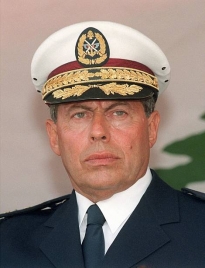Emile Lahoud
Wednesday, January 2, 2019
General Émile Geamil Lahoud (Arabic:اميل لحود) (born January 12, 1936) is the former President of Lebanon. He is the son of General Jamil Lahoud, a leader in the independence movement.
Lahoud served under General Michel Aoun during the final years of the Lebanese Civil War (1975-90). After an Arab League-brokered cease-fire took effect, Lahoud crossed over into Syrian-occupied west Beirut. The Syrians were looking for a Maronite military officer to assume the position of army commander for the pro-Syrian regime in west Beirut, which was endorsed by the 1989 Taif Agreement. Lahoud was offered the position. According to one source, Lahoud had connections to an influential Syria army officer, Ali Hammoud, who recommended him for the job. He quickly accepted. He served in various posts in the military, including commander-in-chief of the army from 1989 to 1998, and then ran for the presidency in 1998, to general approval.
Under the Lebanese constitution, the President's term was only supposed to be six years. However, in 2004 the parliament voted to extend his term for an additional three years, to 2007. Many Lebanese and international observers agree that the extension was illegal and the constitution was illegally amended.
The parliament was pressured to vote for the constitutional amendment to keep him in power by Syria (the main political broker in Lebanon). Currently he is unpopular among many different groups in Lebanon, including the Christians led by Cardinal Sfeir and the Druze led by Walid Jumblatt. They view him as a puppet controlled by the Syrians.
Lahoud is half Armenian and his wife is full Armenian.
Quotes from Lahoud's Armenian Genocide Statement of April 24, 2005
"Nobody can forget the call of the innocent. Their shed blood should be a lesson for all of us and we should do everything, both the authorities and common citizens, to avert such crimes to be committed in the world again."
"Today, all the members and the communities of the Lebanese people express their support to their Armenian fellow-citizens and to all the Armenian people. They again confirm that the recognition and the respect for others' rights are the bases for good international relations."
"Lebanon that suffered from violation of its rights for a long time and the law couldn't overcome that situation without uniting its people. The horrible genocide will be a great historical lesson for us. That will help us remain united and concentrate our forces on building a society based on humanity, tolerance, peace and respect for rights."





